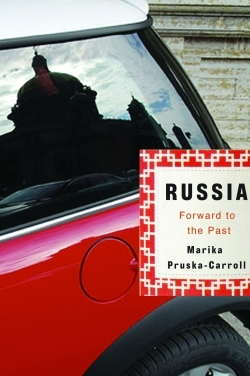Russia
Forward to the Past
Marika Pruska-Carroll offers an insightful and rewarding contention: Russia is regressing politically in the face of economic and educational progress and an ongoing social revolution. Pruska-Carroll was raised in Poland, earned her PhD in the US, added post-doctoral studies at Moscow State University, and most recently taught in the political science department at Concordia University, Montreal, specializing in Russian politics and related topics. Given her extended annual travel throughout the Russian Federation, she is a highly qualified analyst.
Pruska-Carroll posits a viewpoint increasingly validated by media reports: despite the emergence of a vibrant “new” Russia, the iron collar of the “old” political system is being reimposed. The fix is in: Putin will become president and centralized authority will persist. Pruska-Carroll analyzes critical shifts in values and beliefs as ordinary Russians seek a new national identity. Many claim to be “bored” with “big politics” but recognize its importance. At the personal level, Russians of all ages fiercely believe that Russia will reemerge as a great power. She notes a surging patriotic pride among all classes and age groups. The appalling suffering experienced under Stalin draws little comment, and renewed respect is shown to “strong” rulers of the past—Ivan the Terrible, Peter the Great, and Stalin. For Russians, these rulers’ material achievements outweigh related human costs. Russia’s vastness and resources (oil, minerals, and timber) are a further cause of pride, and in terms of cultural wealth, many young Russians now believe that their own music, poetry, and art are more significant than once-favored Western imports.
Pruska-Carroll explores the positive changes in Russian life as enjoyed by the privileged rich and well-to-do classes. She has interviewed people on how they earn, spend, and live; how they get about; their social dynamics; their values; their image of Russia, and how they see its future. This is a valuable approach. Most authors primarily explore systems—Russia’s political structures, the workings of the economy, education, investment possibilities, and commercial law—rather than reporting on the differing lives, hopes, values, and thinking of the many diverse elements of the population.
The author reports on nouveaux-riches Muscovites, whose pursuit of luxury goods leaves Americans paralyzed at the starting gate. One anecdote perfectly captures this excess: “That’s a great leather jacket you’re wearing. Where did you get it? How much did you pay?” “Two hundred dollars—on Arbat St.” “You fool, you could get the same jacket for five hundred on Manezhna St.” This same energy and lust for the new permeates every aspect of Russian life—even though the young never knew the deprivations of the pre-1990 Communist regime. Luxury cars, apartments, and restaurant meals are de rigeur. These “new” bribe-ready Russians are free-floating, creating a sharply defined reality that’s neither anchored to the past nor seeking any particular future. But too few people enjoy the good life; with incomes of about $3,000 per year, most people see their hopes and aspirations going unrealized. Remaining in Moscow, one of the world’s most expensive cities, means moving in with others in drab, distant high-rises and facing falling subsidies and rising costs. This divide spells trouble: it is likely that the Kremlin will contain it by returning to the authoritarian past, curtailing freedom of expression, censoring the media, and generally clamping down.
In their quest for a new national identity, Russians are flocking to the Orthodox church, which is now flexing its muscles in rebuilding cathedrals and shrines and in assigning patron saints to government departments. The church’s increasingly powerful voice has generally supported authoritarian governance, and it has not forcefully opposed rising chauvinism, expressed in hostility toward the nation’s non-Russians.
Given the collapse of the Russian Empire in 1917 and that of the Soviet Union in the 1990s, the population values “stability” and “normality.” Hence the majority’s support of Putin. In light of Pruska-Carroll’s findings, it appears likely that Putin’s regressive authoritarianism will survive and even thrive as Russia seeks superpower status. Russia: Forward to the Past perfectly captures the underlying dynamic of Russian reality today: true democracy would threaten Russia’s increasing hunger for power and influence.
This powerful and far-reaching survey, with its many one-on-one interviews, is an important, incisive, and timely book, clearly analyzing complex trends.
Reviewed by
Peter Skinner
Disclosure: This article is not an endorsement, but a review. The publisher of this book provided free copies of the book to have their book reviewed by a professional reviewer. No fee was paid by the publisher for this review. Foreword Reviews only recommends books that we love. Foreword Magazine, Inc. is disclosing this in accordance with the Federal Trade Commission’s 16 CFR, Part 255.

